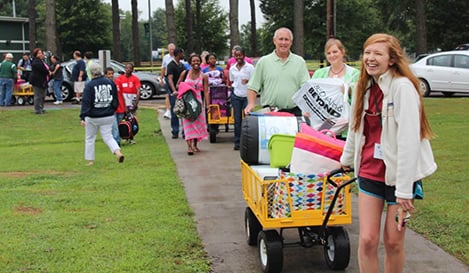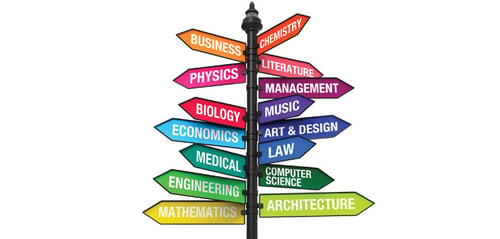Let me just qualify everything you’re about to read with this: I’m 100% not the best person to be giving you advice. I went off to college, made plenty of mistakes, and did not make honor roll once. I was not a part of Phi Beta Kappa, Alpha Kappa Psi, or any of the fraternities that require some level of academic prestige. My freshman year, I skipped an entire Biology 101 exam to take a 12-hour road trip to go to a football game which, if we’re being honest, I’d probably do again. It was a huge win that kicked off an incredible season in which Missouri finished fifth in the nation.
So again, on paper, most definitely not the type of student any sort of college would include in their marketing slick to parents. Now, I didn’t fail by any means. I ended up with a GPA high enough to at least get into graduate school. Partially because what I lacked in top-percentile GPA, I made up for with involvement and experience.
The four items below that I’m recommending are simply from my perspective having the college experience I had. It may be great advice for some people and for others not so much, so I encourage you, along with any other advice you’ll receive in your life, take it with a grain of salt and think “how does this apply to me?”
MAKE SURE YOU EXERCISE YOUR ABILITY OF CHOICE.
 The first time when you truly have the unbridled ability of choice in your life will be when you move into your college dorm, you hug your tearful parents goodbye, and they speed off back home. In high school, you have some choice, but with guardrails, and those go away in college. You have the choice to either go to class or not. To spend money you may or may not have. To eat six meals at the dining hall a day. You, for the first time, are empowered by choice. Make sure you use that.
The first time when you truly have the unbridled ability of choice in your life will be when you move into your college dorm, you hug your tearful parents goodbye, and they speed off back home. In high school, you have some choice, but with guardrails, and those go away in college. You have the choice to either go to class or not. To spend money you may or may not have. To eat six meals at the dining hall a day. You, for the first time, are empowered by choice. Make sure you use that.
 If you decide that you want to switch out being pre-med into a theater major, (or vice versa!) take some theater classes and explore that. In high school, if you had one particular type of clique you hung out with, but never felt fully comfortable fitting in with, explore hanging out with different types of people in college. Obviously, any choice will result in consequence of some sort, but only in college you can fall flat on your face, take a semester to pull yourself together and get back on track. Once you’re in the “real world,” consequences have more severe implications than in undergrad, so take this time to allow yourself to choose, explore, and fail.
If you decide that you want to switch out being pre-med into a theater major, (or vice versa!) take some theater classes and explore that. In high school, if you had one particular type of clique you hung out with, but never felt fully comfortable fitting in with, explore hanging out with different types of people in college. Obviously, any choice will result in consequence of some sort, but only in college you can fall flat on your face, take a semester to pull yourself together and get back on track. Once you’re in the “real world,” consequences have more severe implications than in undergrad, so take this time to allow yourself to choose, explore, and fail.
UNDERSTAND HOW YOU TAKE IN AND PROCESS INFORMATION.
Like I said earlier, I was not a great student, at least not until the start of my junior year. The summer before, I took an exam called the Highlands Ability Battery test and it outlined my strengths and weaknesses as well as the most effective ways I retain and understand information - I learn best by taking handwritten notes and using visuals. As you develop your study skills, consciously think about how you learn best. If you’re a handwritten notes person like I am, leave the iPad at home and use spiral bound notebooks.
Truth be told, this may be the most valuable skill I learned in college. I understand how to take a concept and put it into terms that I will understand, as well as absorb that material in ways that I’ll retain. This is something I use on a daily basis at work by carrying a notepad with me at all times as well as literally drawing out a diagram if I’m really not understanding something. If you can learn how to teach yourself, you’re well-positioned for success later on.
LEARN TO BE ADAPTABLE
You will have at least one bad roommate, you will hate at least one professor, and you’re going to make one really dumb decision in school. These are facts of college life, everyone encounters them. These also carry over after you leave college, as you’ll have bad coworkers, awful managers, and will make several more poor decisions. How you handle these will set you apart from your peers. Learning to take what’s given to you and make the best of it will bring you more success and happiness in life. This seems like a very basic life skill, but if you learn that your professor only teaches in order to continue to do research, you can at least figure out early on alternative ways get the information you need and be prepared for their poorly-worded exam questions.
VOLUNTEER OR TAKE LEADERSHIP POSITIONS, BUT JUST DON'T DO IT FOR A RESUME.
Being a leader within any type of campus organization will benefit you greatly after college. It will teach you how to run a meeting, strategically plan, communicate your ideas in an effective manner, and handle conflict. Developing these skills and bettering yourself along with the organization should be the reason for you taking a leadership role. Also, your time in college is very short and valuable, you should want to spend on it something that you enjoy and fulfills you.
What you should not be doing is taking the leadership role solely because it’ll look great on your resume. You will encounter people like this, and often, they’re so Type A and dominating that they become ineffective. Or, since they took the position simply for the title for their resume, they’ll do the bare minimum for them to say they did what’s listed under the Experience section. If you find yourself in a situation where you can step up be a leader, ask yourself for which of these reasons you’re doing this.
All four points presented above were designed to be vague, as each individual has an entirely unique 4+ years ahead of them and my hope is that they can be adapted to each person. Make sure you allow yourself the space to enjoy yourself in college and explore. Tampa Prep has set you up well for success, so keep building off that foundation and good things will come.